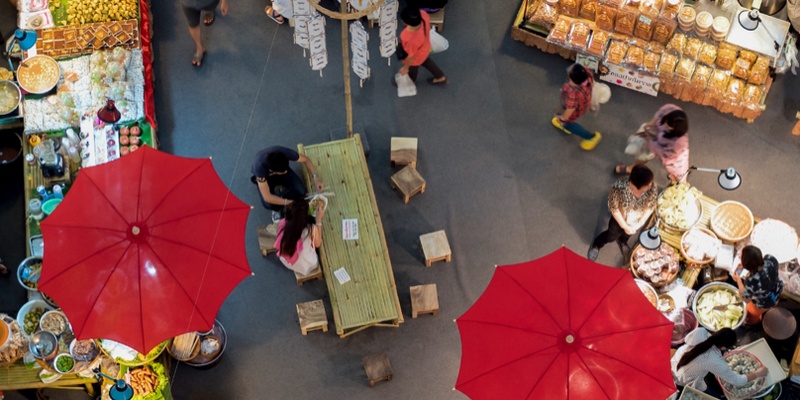BLOG: To end global hunger, more robust efforts are needed to protect plants
Posted on Mon, 04 Aug 2025, 14:38

©iStock.com
By Sarah Brunel, IPPC Secretariat Officer-in-charge and Team Lead, Implementation and Facilitation Unit
What if we can build a world where no one goes hungry?
It may be utopian. But we hold no excuse not to keep moving the needle. We can reduce the number of people going hungry every day – and we have to. In 2024, there were 15 million less people who experienced hunger compared to 2023, according to the latest report on the State of the World’s Food Security and Nutrition* (SOFI) released last week. But still, in 2024, between 638 and 728 million people experienced hunger.
While food insecurity declined in Latin America and the Caribbean and Asia, it continued to rise in Africa. The cost of a healthy diet saw the greatest increase in Africa compared to other regions while unaffordability of food increased in the region. The prevalence of moderate or severe food insecurity in Africa (58.9 percent) is more than twice the global average of 28 percent, whereas prevalence in Latin America and the Caribbean, Asia and Oceania is below the global estimate. In 2024, around 3 out of 4 people in low-income countries were unable to afford a healthy diet. Meanwhile, less and less people in middle-income- and high-income countries are unable to do so.
These are worrisome numbers that account for people whose lives have been upended by hunger. At the core of making food available for all are safe and nutritious crops that are free from pests and diseases. No less than 80 percent of what we eat is sourced from plants.
It only makes sense that at the macro level, a global mechanism is in place to protect food sources that are a lifeline to billions. This is what the International Plant Protection Convention (IPPC) stands for, implementing plant health standards that foster pest-resilient agricultural trade.
Plant health standards ensure that food supply chains are protected from pests. Uninterrupted food supplies keep food prices stable, which allows more people to afford food. While multiple factors cause the rise in global food price inflation – such as pandemics, conflicts and climate change – there is no arguing that a pest outbreak can set back food production even farther. The SOFI report cited that plant pests and animal diseases were strong contributing factors to the spike in food prices last year which affected food markets and global trade.
International Standards for Phytosanitary Measures (ISPMs) are thus critical in this scenario. They serve as traffic lights in global trade by regulating the safe flow of plants and plant products. They empower importing countries to prevent potential pest outbreaks that could disastrously become irreversible.
Globally recognized standards in the trade of specific commodities like mango, a widely traded produce, are already in place through ISPM 46 or the Commodity-specific standards for phytosanitary measures. Equally important are ISPMs in the trade of staple foods that nourish millions across the globe, such as banana and fresh taro which are next to be published. Working with a group of international experts, the IPPC develops these standards, the latter of which are set to open for consultation among IPPC Contracting Parties and regional plant protection organizations. Standards for bean seeds and citrus are also under development.
Access to food becomes even more challenging during humanitarian crises, whether they are due to conflict, crop failure or natural disasters. Delivering food aid carries phytosanitary risks, too. Food and shipments can unintentionally carry pathogens which may harm not only the recipient country but the entire region’s agricultural production. This is why plant health standards should also be applied. To address this, the IPPC adopted a global recommendation to strengthen countries’ phytosanitary preparedness during emergencies. The IPPC has also been hard at work with a group of international experts including aid organizations to develop ISPMs that will ease the safe delivery of relief efforts.
Attaining global food security is a long-term endeavor. At IPPC, our efforts go beyond what we can do now by engaging the next generation of plant health professionals. We have teamed up with the FAO eLearning Academy to develop the IPPC Plant Health Campus, an online platform that offers courses to build the next cabal of plant health stewards.
The SOFI report concludes that sustainable investments and institutional innovation, among others, are fundamental to build resilience to food insecurity. We fully support this and thus urge governments, donors, partners and relevant organizations to invest in plant health, whether through strengthening national phytosanitary systems, creating or updating regulatory frameworks that support plant protection, investing in plant health education at academic institutions or in phytosanitary research.
We know the giants we face – plant pests and persistent hunger – but we have the tools and systems to support the global fight against these. The future is not too far ahead. We must act now and never cease until we build a world where no one goes hungry, and no one is left behind.
Watch the SOFI 2025 video here and the SOFI 2025 presentation by FAO Chief Economist, Máximo Torero Cullen.
The SOFI 2025 report was jointly developed by the Food and Agriculture Organization, International Fund for Agricultural Development, United Nations Children’s Fund, World Food Programme and the World Health Organization.

